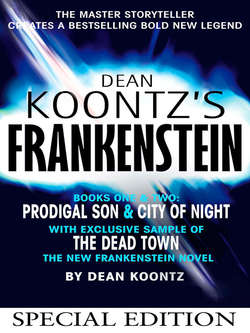Читать книгу Frankenstein Special Edition: Prodigal Son and City of Night - Dean Koontz - Страница 41
CHAPTER 33
ОглавлениеAT VICTOR’S SUMMONS, they came to him in the main lab, two young men as ordinary in appearance as any in New Orleans.
Not all the men of the New Race were handsome. Not all the women were beautiful.
For one thing, when at last he had secretly seeded enough of his creations in society to exterminate the Old Race, humanity would put up a better defense if it could identify its enemy by even the most subtle telltales of appearance. If all members of the New Race looked like gorgeous fodder for the box-office battlefields of Hollywood, their beauty would make them objects of suspicion, subject them to testing and interrogation, and ultimately expose them.
Their infinite variety, on the other hand, would ensure the winning of the war. Their variety, their physical superiority, and their ruthlessness.
Besides, though he sometimes crafted specimens breathtaking in appearance, this enterprise was not fundamentally about beauty. It was at root about power and the establishment of a New Truth.
Consequently, the young men he summoned might be considered extraordinary in appearance only because, considering what they were inside, they looked so common. Their names were Jones and Picou.
He told them about Bobby Allwine in a drawer at the morgue. “His body must disappear tonight. And all confirming evidence—tissue samples, photographs, video.”
“The autopsy report, tape recordings?” asked Jones.
“If they’re easily found,” Victor said. “But by themselves, they confirm nothing.”
Picou said, “What about the medical examiner, anyone who might have been there when the body was opened?”
“For now, let them live,” Victor said. “Without the body or any evidence, all they’ll have is a wild story that’ll make them sound like drunks or druggies.”
Although they were intellectually capable of greater work than this garbage detail, neither Jones nor Picou complained or found their assignments demeaning. Their patient obedience was the essence of the New Race.
In the revolutionary civilization that Victor was making, as in Aldous Huxley’s Brave New World, everyone in the social order would have a rank. And all would be content, without envy.
Huxley ordered his world with Alphas at the top, the ruling elite, followed by Betas and Gammas. Brute laborers were designated Epsilons, born to their positions in a designed society.
To Huxley, this vision had been a dystopia. Victor saw it more clearly: Utopia.
He’d once met Huxley at a cocktail party. He considered the man to be an officious little prig who worried ridiculously about science becoming a juggernaut and more dogmatic than any religion could hope to be, crushing everything human from humanity. Victor found him to be rich in book knowledge, light on experience, and boring.
Nevertheless, Huxley’s nightmare vision served well as Victor’s ideal. He would make the Alpha class almost equal to himself, so they would be challenging company and capable of carrying out his plans for the day after humanity had been liquidated, when the Earth would serve as a platform for great accomplishments by a race of posthumans who would work together as industriously as a hive.
Now these two Epsilons, Oliver Jones and Byron Picou, set out like two good worker bees, eager to fulfill the roles for which they had been designed and built. They would steal Allwine’s remains and dispose of them in a landfill that operated in higher ground outside the city
The landfill was owned by Victor through another shell company, and it employed only members of the New Race. He regularly required a secure disposal site to bury forever those interesting but failed experiments that must never be discovered by ordinary humans.
Under those mountains of garbage lay a city of the dead. If ever they fossilized and were excavated by paleontologists a million years hence, what mysteries they would present, what nightmares they would inspire.
Although problems existed with the comparatively small hive—as yet only two thousand of the New Race—that he had established here in New Orleans, they would be solved. Week by week he made advances in his science and increased the number in his implacable army. He would soon begin to mass produce the tanks, creating his people not in a laboratory but by the many thousands in much larger facilities that might accurately be called farms.
The work was endless but rewarding. The Earth had not been made in a day, but he had the necessary patience to remake it.
Now he was thirsty. From a lab refrigerator, he got a Pepsi. A little plate of chocolate chip cookies was in the fridge. He adored chocolate chip cookies. He took two.
